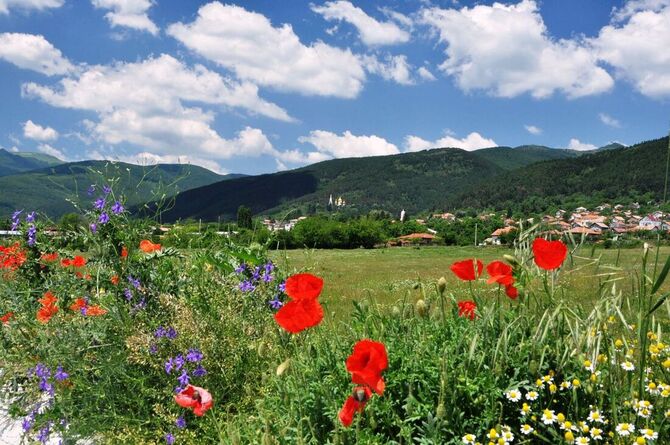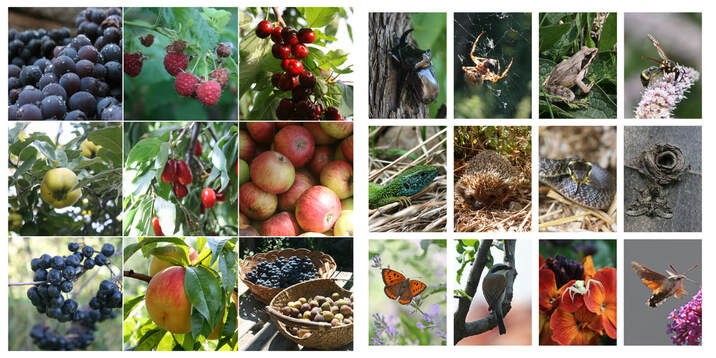Who we are
The Polyculture Project was founded by Paul Alfrey, Sophie Roberts and their two boys Dylan and Archie, and supported by the amazing volunteers that we have host here over the years. Currently Paul and Dylan are working fulltime on the project.
What we do
Our project mission is to develop and promote practices that can produce food and other resources for humans while enhancing biodiversity. We work towards accomplishing this by;
-Researching, designing and implementing systems on the ground - you can find some of our findings here
-Providing working examples of our designs at our sites open for the public to visit - you can find a map of our project gardens here
-Providing high quality education and training to aspiring growers, landscapers and landowners
-Providing consultancy and design for landowners and farmers across Europe - see here for an example of our polyculture farm design.
-Practising an open source policy, whereby we disseminate our results freely and share all aspects of our work on our blog.
We also run a small forest garden plant nursery, growing, selling and promoting the use of plants and plant polycultures that have high ecological and practical value.
We are based is South East Europe and our work is relevant to anyone who lives,gardens, farms, grows in Temperate and Mediterranean climates anywhere on the planet.
-Researching, designing and implementing systems on the ground - you can find some of our findings here
-Providing working examples of our designs at our sites open for the public to visit - you can find a map of our project gardens here
-Providing high quality education and training to aspiring growers, landscapers and landowners
-Providing consultancy and design for landowners and farmers across Europe - see here for an example of our polyculture farm design.
-Practising an open source policy, whereby we disseminate our results freely and share all aspects of our work on our blog.
We also run a small forest garden plant nursery, growing, selling and promoting the use of plants and plant polycultures that have high ecological and practical value.
We are based is South East Europe and our work is relevant to anyone who lives,gardens, farms, grows in Temperate and Mediterranean climates anywhere on the planet.
Why we do it
First and foremost, it’s great fun and very entertaining. Secondly, if you are reading this you're most probably aware of the environmental damage caused by industrial agricultural practices. We believe this damage is unnecessary, and aim to provide healthier models of food production that can yield food and other resources for humans while at the same time promoting biodiversity and general ecosystem health, what we call “polycultures”.
Industrial methods are heavily researched and funded, and there is a general belief among many farmers and growers that this is the only practical way of operating. Following 13 years of cultivating polycultures we are seeing that small scale biologically cultivated polyculture landscape designs are a realistic and practical way of providing food for humans whilst preserving biodiversity and general health in the environment. Furthermore, we believe this type of horticulture/agriculture can help create thriving local economies that strengthen community, provide dignified work and enhance the amenity value of an area.
Little data exists showing the productive capacity of polyculture systems and the economic viability of them. We believe there is a need to fill this gap and provide data and concise coherent models that can be replicated easily. Our project intends to go some of the way in filling that gap.
We make no claim that polyculture can feed the world but we do claim with 100% conviction that anyone can grow polyculture and by doing so they are taking a small but significant step in reversing a negative trend and we are pretty certain they will have a great time doing it :)
Follow our blog - www.balkanecologyproject.blogspot.com
Find us on - Instagram - Linkedin - Twitter - Substack
Little data exists showing the productive capacity of polyculture systems and the economic viability of them. We believe there is a need to fill this gap and provide data and concise coherent models that can be replicated easily. Our project intends to go some of the way in filling that gap.
We make no claim that polyculture can feed the world but we do claim with 100% conviction that anyone can grow polyculture and by doing so they are taking a small but significant step in reversing a negative trend and we are pretty certain they will have a great time doing it :)
Follow our blog - www.balkanecologyproject.blogspot.com
Find us on - Instagram - Linkedin - Twitter - Substack
Contact UsThe Polyculture Project is our development of Balkan Ecology Project15 Dobri Kartolov
Shipka 6150 Bulgaria phone - +359988342649 email - balkanecologyproject@gmail.com |
|



